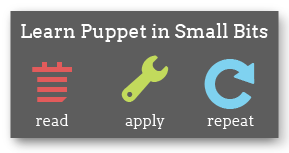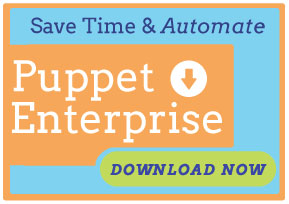A newer version of Puppet Enterprise has been released!
Navigation
- Introduction
- Overview
- Installing
- Upgrading
- Using Puppet Enterprise
- The Accounts Module
- Puppet Compliance
- Known Issues
- Troubleshooting
- Answer File Reference
Welcome to Puppet Enterprise!
Thank you for choosing Puppet Enterprise 1.2. This distribution is designed to help you get up and running with a fully operational and highly scalable Puppet environment as quickly as possible.
About This Manual
This manual covers Puppet Enterprise version 1.2, and documents its installation and maintenance. In its current form, it is not intended to teach the use of Puppet or MCollective to new users. For an introduction to Puppet, we recommend starting with the Learning Puppet series; for an introduction to MCollective, we recommend starting with the MCollective documentation.
System Requirements
Puppet Enterprise 1.2 supports the following operating system versions:
| Operating system | Version | Arch | Support |
|---|---|---|---|
| Red Hat Enterprise Linux | 5 and 6 | x86 and x86_64 | master/agent |
| Red Hat Enterprise Linux | 4 | x86 and x86_64 | agent |
| CentOS | 5 and 6 | x86 and x86_64 | master/agent |
| CentOS | 4 | x86 and x86_64 | agent |
| Ubuntu LTS | 10.04 | 32- and 64-bit | master/agent |
| Debian | Lenny (5) and Squeeze (6) | i386 and amd64 | master/agent |
| Oracle Linux | 5 and 6 | x86 and x86_64 | master/agent |
| Scientific Linux | 5 and 6 | x86 and x86_864 | master/agent |
| SUSE Linux Enterprise Server | 11 | x86 and x86_864 | master/agent |
| Solaris | 10 | SPARC and x86_64 | agent |
Puppet’s hardware requirements will vary widely depending on the number of resources you are managing, but in general, you can expect a 2-4 CPU puppet master with 4 GB of RAM to manage approximately 1,000 agent nodes.
The ActiveMQ server, which runs on the puppet master, will require at least 512 MB of RAM for its Java VM instance. It also requires very accurate timekeeping, which can potentially present problems when running the puppet master role under some virtualization platforms. For this reason, we recommend running the puppet master role on a Xen, KVM, or physical server if you plan to use MCollective.
The puppet agent role has very modest requirements, and should run without problems on nearly any physical or virtualized hardware.
What’s New in PE 1.2
Version 1.2 is a major release of Puppet Enterprise, which adds the following new features:
MCollective integration
Puppet Enterprise now bundles version 1.2.1 of Marionette Collective, Puppet Labs’ server orchestration framework.
Puppet Compliance
Puppet Compliance is a new auditing workflow that uses Puppet Dashboard to track changes to resources.
Puppet Dashboard 1.2
This release upgrades Puppet Dashboard to version 1.2, which boasts vastly improved performance and can export most node views to CSV.
Puppet 2.6.9
This release updates Puppet to version 2.6.9, the latest release in the stable 2.6 series.
Notable new features and fixes since the last version of Puppet Enterprise (which shipped with Puppet 2.6.4) include:
- A new
shellexec provider that passes the command through/bin/sh, mimicking the behavior of Puppet 0.25. - Dramatically improved puppet master performance under Passenger.
- Puppet master under Passenger no longer requires two runs to detect changes to manifests.
- A stable inventory service API, which is used by the new version of Puppet Dashboard.
- Selectors can now use hashes.
- Nested hashes are now allowed.
- Creation of system users is now allowed.
- External node classifiers can now support parameterized classes.
- New puppet inspect application for the Puppet Compliance workflow.
- $name can now be used to set default values in defined resource types
For more detailed information about the differences between Puppet 2.6.4 and 2.6.9, please see the Puppet release notes.
Accounts 1.0 Module
PE now includes a ready-to-use Puppet module for managing user accounts. This module provides an account defined type and an optional wrapper class that lets you store all account data in an external YAML file.
Stdlib 2.0 Module
This helper module extends Puppet with:
- A new
facts.dFacter extension that can read system facts from an arbitrary mix of text, yaml, json, and executable script files stored in/etc/puppetlabs/facter/facts.dor/etc/facter/facts.d. - Several data validation functions, including
validate_array,validate_bool,validate_hash,validate_re,validate_string, andhas_key. - Two data loading functions:
getvarandloadyaml. - The
file_lineresource type, which ensures that a given line exists verbatim somewhere in a file. - The
anchorresource type, which is used to enhance readability in certain Puppet Labs modules. - A set of standardized run stages (available when class
sdlibis declared).
How to Get Help and Support
If you run into trouble, you can take advantage of Puppet Labs’ enterprise technical support.
- To file a support ticket, go to support.puppetlabs.com.
- To reach our support staff via email, contact support@puppetlabs.com.
- To speak directly to our support staff, call 1-877-575-9775.
Other Documentation
For help with features not specific to Puppet Enterprise, please see the main Puppet documentation and the MCollective documentation.

